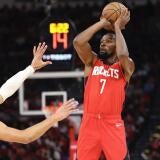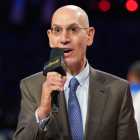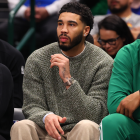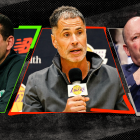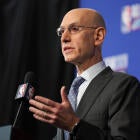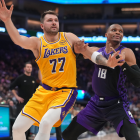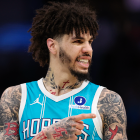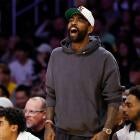How the three oldest active players in the NBA managed to stick around in a young man's league
Vince Carter, Udonis Haslem and Kyle Korver have managed to say in the league well past their prime
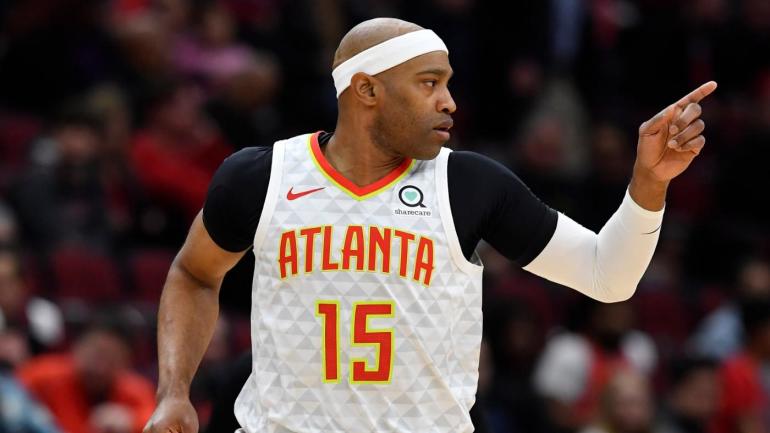
The average age of an NBA player for the 2019-20 season is 26.18 years old. Players are getting younger, and the game is getting faster, but the three oldest players in the NBA, Vince Carter (42), Udonis Haslem (39) and Kyle Korver (38), have managed to stick around in what has turned into a young man's game.
All three players bring different vantage points to their respective NBA careers. Carter was a top-five draft pick in 1998. He was an All-Star through his prime, made deep playoff runs and still gets arenas on the road to chant his name.
Korver was a late second-round draft pick who made a name for himself as a sharpshooter that every team would want to have. He holds the NBA record for highest 3-point percentage in a season (53.6 percent), and his career 42.8 percent conversion rate from beyond the arc ranks ninth all-time.
Haslem went undrafted out of the University of Florida but fought and clawed his way for everything he's earned in his NBA career, which includes being the Miami Heat's all-time leading rebounder to go along with the three championship rings he calls his own.
With 17-plus years of experience for each of them, they've seen several iterations of the NBA. Carter has seen the most, having caught the tail end of the Michael Jordan era, but they've all witnessed the Kobe-Shaq Lakers, the rise of LeBron James and the Warriors dynasty. They all agree that the most notable change through their careers has been the style and the pace at which the game is being played. Haslem notes that there's less defense being played, as well as more fouls which result in more points. He entered the league guarding guys like Chris Webber and Kevin Garnett, now he has to venture further away from the post and guard ball handlers too.
"I've always been an undersized power forward, and I've been fortunate that at my size I've always had the ability to move my feet, be agile and mobile," Haslem said. "But for the average center whose become extinct, now it's a little more difficult as centers and power forwards because you have to be able to move your feet and contain ball handlers too."
While some might consider the lack of defense, high-scoring games and the number of fouls being called a negative, Korver believes that the game has only improved since he's been in the league.
"There's no more slow and just using your strength to hold on to guys, you have to be able to move efficiently and well," Korver said. "You have to be able to make plays somehow with whatever your skillset is, and it's just a much faster and smarter game. The coaching has gotten so much better, front offices have gotten so much smarter in what they're looking for, player development has gotten so much better, training staffs, medical teams, everything is so much better and it's all, to me, created a better product."
The style of play today favors younger players who have grown up knowing that being a traditional center who can block shots and rebound isn't going to cut it anymore. On the annual roster survey conducted by the league before the opening night of the season, a player is selected as the "NBA's Composite Player." This represents the traits that an average NBA player has. For this season, the Warriors' Glenn Robinson III was chosen, because he closely resembles the average NBA player based on height, weight, age and experience.
Robinson stands 6'6", weighs 222 pounds and will be 26 years old in January. Beyond that though, Robinson's on-court skills also closely align what teams are looking for now. He has an effective 3-point shot, is a big wing player that can be switched on defense and as Warriors coach Steve Kerr puts it, "fits the modern game well." Every team in the league is always looking to get younger guys who have the potential to be a star or a quality role player, which is something that Carter says has changed since he entered the league.
"Right now young guys are getting those opportunities, and it's flipped around because the veterans were the ones getting the opportunities," Carter said. "You knew you could stick on that team because your basketball knowledge is essential. There's still a lot of guys out there who were around my time that could still do it, it's just a matter of opportunity. Now they've opened the gates of the young guys coming out early, and that's fine it's just how it goes. It weans out the older veterans down the line."
In order to ensure that he never became a veteran who got pushed out of the league, Carter committed himself every offseason to a routine that ensured he would be ready to go on opening night. Now, as the oldest player in the league, with a record-breaking 22 years of NBA experience, everyone always asks him what the secret is behind his extensive career.
"I could've easily gotten to 15-16 years not willing to do all the steps it takes for me to get prepared now and that would be it," Carter said. "Skipping steps won't keep you around long, and all of the laundry list of things I do every day I still enjoy and that's why I'm still here. If I'm not willing to do that, the secret doesn't matter, because you'll skip steps after a while because you'll get tired of doing the same thing over and over. But I've committed to that so long ago that it's part of me now."
Carter's committed himself to show up earlier than everyone else to get work in, spending extra time stretching and on the massage table and being smart with how much time he's on the court. Haslem can attest to using his court time efficiently, both in games and practices. He never garnered the type of attention LeBron or Dwyane Wade did when they suited up for the Heat, but Haslem has always been revered within Miami's organization for the amount of work he's put in over his career. As the elder statesman on the Heat now, the 17-year veteran has taken a backseat to the younger players on the roster. While he spends a great deal of time conditioning on a daily basis, most of his work comes through mental repetition.
Korver describes it as fine-tuning. Over the years, he's realized that time management skills are incredibly important as you advance in your career.
"There's a time in your career where you just need to get locked in the gym and shoot until your hand just wears out," Korver said. "Then there's a time where you have to go, 'okay 30 minutes is my court work, how do I maximize this time and not just be out here to be on the court.' Anyone who spends any amount of time in whatever their craft is, you learn how to be more efficient if you're trying to be more aware of it all."
Still, 17 years of anything can get pretty monotonous, so why do these guys still decide to lace their shoes up? They all get asked a variation of that question, and they all agree that the love of the game is a major factor. Carter has already announced that this season will be his last, and while Haslem only signed a one-year deal with the Heat over the summer, he said that he's still playing because he feels a responsibility to pass on the famed "Heat Culture" to the younger players.
"Guys like Alonzo (Mourning) passed it along to me, so it's my responsibility to pass it along to the next generation," Haslem said. "The last couple years have been up and down, and I felt like I could've done a better job, so for me to retire I have to do my job and make sure the culture is in the right hands and it's on the rise."
Korver though, is having a difficult time reconciling with stepping away from something that's been such a massive part of his entire life.
"This is an interesting place to be in and it's a hard thing to just say, okay next," Korver said. "In the beginning (of my career), I was just grateful to be on a team. Then I found out your pension is maxed out at like 11 years, and I'm like 'man I just want to get to 11 years and max out that pension.' But then you find your way, and the hope for me is you're not forced out because your body quits or breaks. That's why you do all the work to try and maintain it the best you can. At some point though it happens, and you have to be ready for that too."





